Affiliate Disclosure: We earn a commission if you purchase through one of our links at no additional cost to you.
Copyright Infringement on The Photo Flunky Show – Episode 2
Copyright infringement makes you feel violated. The emotional reaction is often to sue, but is that the right decision when someone uses your photo without permission or payment?
I share my own experience filing a copyright infringement lawsuit and how things worked out. I also point out some of the reasons why filing a lawsuit may not be fore you, including the possibility of winning the suit and losing money in the process.
A lawsuit is not a quick process. Be prepared to wait 12-18 months for conclusion, and the odds are that your case will not appear in court. As I learned from my attorney’s, the law favors a settlement. It’s impossible for the courts to process every infringement lawsuit that gets filed.
There are attorneys who will take your case on a contingency basis, which means you don’t pay them unless they win on your behalf. However, they get a large share of your settlement or court victory. While the attorneys may not charge you anything, you’re still on the hook for court filing fees and other expenses that may arise.
Related Posts
When Should You File a Copyright Infringement Lawsuit
Subscribe to The Photo Flunky Show
Thank you for listening to The Photo Flunky Show. Make sure you get every episode by subscribing.
iTunes – https://williambeem.com/itunes
Stitcher – https://williambeem.com/stitcher
Google Play – https://williambeem.com/googleplay
Blubrry – https://williambeem.com/blubrry
Social Media Links
We love seeing your photos and keeping in touch with you on social media. Here’s where you can find us.
Transcript
PHOTO FLUNKY – Episode 2
I’m your host, William Beem. Welcome to the Photo Flunky Show, episode number two.
Today we’re going to be talking about copyright infringement and are you stupid if you decide to sue about it?
Hi, welcome back to the show. Copyright infringement sucks. It’s almost a feeling of violation when you go out there and you find that someone else is using your photo. And I don’t mean just putting it on a blog post or using it for something that’s not going to be earning them any money. I’m talking about copyright infringement when somebody has a clear commercial purpose for using your photograph. They just stole it, they just took it. They didn’t take the time to contact you and they didn’t have the common decency to know if they couldn’t find you, that they shouldn’t use the photo.
A lot of people think that they way to get around an infringement like this is to use watermarks, and trust me, anybody with Photoshop can get rid of a watermark.
I have a friend who has a wonderful photo of a model with three different watermarks on it, and then he found it used in a magazine in Brazil and they had removed every single one of his watermarks. All it took was a little bit of work with a pen tool and a clone stamp and the healing brush and those watermarks were gone!
What happens when you find it? You tell your friends. That’s usually the first thing that happens and a lot of them are going to tell you, “You should sue! Go after them!” I mean, think about what your options are. You can send them a DMCA Take Down Notice. You can contact them. You can ask them to do the right thing. And sometimes that may work.
But the threat of a lawsuit is what a lot of people talk about. Whether you actually go through and do it or not is a tougher decision than I think most people think, if they haven’t been through it already.
I had the misfortune of going through this a few years ago. I was emotional about it. I decided no more notices. No more take downs. I’m going to sue.
One of my friends referred me to an attorney who works on this and he did things on a contingency basis. Although ultimately I had a settlement, I got some money out of it and it was a decent chunk of money, it just really left a bad taste in my mouth and I kind of want to warn people, before you decide that you’re going to go sue for copyright infringement, make sure you understand what it’s really about.
With that in mind, let me give you a short course on what I learned as a copyright infringement lawsuit and here’s the usually disclaimer whenever someone talks about anything legal.
I’m not a lawyer. I’m not going to pretend to be a lawyer. I’m just simply going to tell you these are my experiences and what I learned.
And rule number one, a lawsuit is not an emotional action. It’s a business. You may be upset, you may be angry you may be just fiercely proud of your image and how dare they steal it! It does not matter when you go to a lawsuit. Lawyers are in business and they are not in business for your righteous cause. They are in business to earn money and to make a profit.
That’s not to say that they can’t sympathize, empathize and all those other wonderful little words that come to mind, but they are in it for the money.
And when you go to do a photo copyright infringement lawsuit, there are opportunities to do what is called a contingency lawsuit, meaning that you don’t get charged for the attorney’s time unless they prevail and then they will take a cut of the earnings that come from it. And those earnings are usually going to be in the form of a settlement. Only about two per cent of the cases, I’m told, go to trial. So for the most part, if you’re going to do that, you’re probably going to settle. You’re probably not going to have your day in court and that’s OK. From what I’ve been told by attorneys, the legal system favors a settlement. The courts cannot handle all the lawsuits that would result for every infringement lawsuit that was filed.
Item number two: The people who are advising you to sue probably don’t have any experience with lawsuits. A lot of people see things on TV, they’ve heard stories, but they’ve never actually gone through it and if you’ve got friends that are telling you that you should sue, ask them point blank: Have you ever gone through a lawsuit like this? And if the answer is no, smile, nod, thank them for their advice and do your research.
Number three: The people who quote law to you on social media have no experience with the law. Nothing is probably more annoying than to find out that the advice that you’ve always heard about having a copyright the moment you take the picture, the moment you create the work, you’re covered, you’re protected.
Well, here’s what the reality is, that I learned from going through a lawsuit. If you do not have a registration with the US Copyright Office, you do not have the keys to the Federal Courthouse. Copyright infringement is federal law, it will be tried by a federal court and the first thing the attorney is going to ask for is, do you have a valid registration?
If the answer is yes, everything can proceed. If the answer is no, well then bye bye. You’ve got absolutely no proof that the photo is yours. The registration is inexpensive, it’s easy to do, you should do it for all of your photos and if you don’t have it, don’t bother filing a lawsuit.
And quite honestly, the Judge isn’t going to get the chance to tell you this because your attorney knows this as well and he or she is probably going to tell you that you don’t have a federal lawsuit here because you don’t have a valid copyright registration. It is a requirement for US Court.
Here is the other part. Number four. The people who defend having stolen images also have no experience with the law.
Let’s take the case that I’ve got. It was a company out in California. They were setting up a new website and they wholesale downloaded images from Flickr, including one of mine that was registered with a copyright, and posted them on their site, trying to attract people. It was a blatant abuse of copyright and federal law. That site is no longer in business now. Not because of my suit, but probably because of other things that they have learned along with way from talking to their lawyers, but it’s just that’s how quick and easy it can happen. They just went through and started downloading everything.
I found out about it from an online conversation with a number of concert photographers, professional photographers who were whining and complaining that these guys stole their images and yet not a single one of them had registered their images with the US Copyright Office. I did. And I got paid. As a matter of fact, one of the photographers told me I probably got paid more than the band did that played at the show that I was shooting.
And it was not a big name band. This was talking about a little night club act in Orlando.
Number five. The only way to control your lawyer is to pay your lawyer and this is one of the most painful lessons I learned, is I was working off of a contingency lawsuit. That means, again, the attorney was not going to charge me any fees for his time, but it also meant that since I wasn’t paying him, he wasn’t really working for me. He was in effect using me as a means to get a chance to earn some revenue. So when push came to shove and there was a settlement offer, I didn’t think it was good enough and I decided I wanted to go ahead and continue going to court because the other side was adamant that they were well funded, they were ready to dig their heels in because they were afraid that if they gave me a decent settlement that others would come after them, which was probably valid and true. They figured, you know what? We’ve got money behind us, we’ll go to court. Will you?
And I told my attorney, “Yes I will.” And my attorney said, “Well, we won’t, because it’s not going to be financially valid for us.”
And that’s the part that really irked me because I started at the very beginning and the first question I asked my attorney. “If this goes to trial, will you take it there?” Because I’m not paying him. It’s a contingency lawsuit.
And the answer I got back was emphatically, “Yes. We will go to trial.” Up until the moment when I said, “Let’s go to trial.” And then the senior partner came down and said, “Well this case isn’t worth going to trial. We’re not going to take it there.”
Basically, they caved. My attorneys did not take it to trial. They figured the cost of going through the lawsuit exceeded the amount of money that they were going to be able to get from the copyright infringement and looking at the figures that we had agreed upon for their percentage, they were going to spend more money than they were going to earn. It was a business decision. They caved. That simple.
A contingency lawsuit means that you don’t pay your attorney’s fees. If you’re on the other side of the coin and you’ve been named as a defendant in a copyright infringement, there is no such thing as a free defense. No lawyer is going to defend you on a contingency basis. He or she is going to charge you, and that is something that you actually have in favor if you are filing a copyright infringement lawsuit against somebody else, is that it’s going to cost them a lot more money than it’s going to cost you if you go the contingency route. That’s why most of these cases settle.
On the other side of the coin, there is really no such thing as a free lawsuit when you’re filing the case, because there are still fees and costs that go along with the lawsuit that the lawyer is not going to pick up for you. These are filing fees. You’re going to spend close to $1,000 just to get into the courthouse. What the attorney is offering you is his or her time doing the case without charge until the settlement or victory of some kind, and then they take a percentage, but they are not going to front you any money that the courts are going to demand. So that comes out of your pocket.
Number eight. The jurisdiction where you file may not be where you expect. I live in Florida, but I didn’t think about this. I made the mistake of hiring an attorney in California based upon the recommendation of a friend.
So when it came time to file the suit, the defendant was in California, my attorney was in California, they went ahead and convened my lawsuit in California. And when I wanted to be able to do some depositions back and forth electronically, both sides, my attorneys and the defendants said no. You need to fly out here!
And that means if you don’t have the trial happening in the region where you are comfortable and you’re traveling back and forth, you’ll have all the expenses to get there. No-one’s going to front you that money either.
And going to trial, I would have been flying back and forth from Orlando to California quite frequently. It would have been extremely expensive on my behalf and it certainly would have outweighed the earnings that I finally made.
Number nine: I’ve kind of alluded to this already. If the defendant gets stubborn and refuses to settle, your free attorney, the one who is doing a contingency basis, is going to cave on you. He or she is in this for business. They are going to look at it and say, it doesn’t make sense. They are not looking at this emotionally as some people are who file things. You can go ahead and file your case, find out that the defendant doesn’t want to settle, it’s going to trial and you can go to trial, win, earn a settlement and still lose money because the expenses that you’re going to have for fees going back and forth in case your attorney says, “I’m no longer going to do this for you on a contingency basis because it’s not a good business decision,” you’ll end up spending money on that or other fees that come along from the court. You can win, earn your money and still come out behind.
It’s a business decision. You have to look at the potential options, you have to come up with the idea of what is this worth to you? And you also have to realize things can change. When we started this off, my attorney said, “Don’t worry. Everybody settles. Only two per cent go to a trial and this doesn’t look like one of those cases. I’ve been through a lot of them.” Well, I was one of the two per cent. I got stuck with some guys who had good funding behind them and they were willing to stand up and say, “We’re not going to let people like you come over and take our money.”
Even though they stole from me, and had violated the law, this is a civil process. It really was a matter of negotiating an outcome, and your attorney is a negotiator, he or she is a business person, they are going to go where the money is. And if the money isn’t there, they are not going to go with you and they’re going to do everything they can to coerce you into following their lead.
Last thing is number ten. You don’t have an attorney. Your attorney has a business. Particularly if you’re not paying the attorney, you’re not getting someone to represent you. You’re being used by the attorney as you go through this. If you’re paying the attorney, the attorney is going to do legally whatever he or she can, so long as you keep paying the fees. And that’s where, if you’ve got all the funding behind you that you want to, you can be as stubborn as you want, the attorney will be happy and smiling because he or she keeps getting paid and they will do everything that you want to do, whether it makes sense or not. But the attorney has a business. They are going to get paid, either from you or from what they think is likely from the outcome of a contingency lawsuit.
So please, think about what this is going to be in a business sense, rather than an emotional sense. It’s easy to get worked up, it certainly makes you feel violated when you see somebody is using your photo without permission, without payment, without even the silly little notion of credit. They have just completely taken it and you want to sue them. I understand the emotion. I went through it, but my honest advice is, think hard. If you’re going to sue somebody, you want to make sure that they have the resources to pay you. Because what good does it do to sue someone who doesn’t have money, cash on hand or resources to sell to pay you back. Just because you win doesn’t mean that you get paid immediately.
Then they still have to pay the court and the court has to pay you and quite honestly, you’re not getting anything until they’ve paid up. If they don’t have the resources there is no point in suing a poor person.
So there are no guarantees with this. I mean technically you can win, walk away, feel lousy, get a little bit of money or maybe lose money because of all the processes that you’ve gone through. But it’s a business decision, not an emotional one and I hope that it doesn’t happen to you. If you’re going to have someone take one of your photos, in that case I hope it’s someone like …………. so they’ve got the money behind them to give you a nice big settlement.
If you’ve ever been through a copyright infringement lawsuit, I’d love to know what experiences you had. You can find the show notes at photoflunky.com, and please leave a comment and let me know what you’ve been through.
Thank you for listening to the Photo Flunky Show. I’m William Beem. We’d love it if you’d stay in touch with us. It’s easy to do.
All you have to do is send a text message to FLUNKY and send that to the number 33444. That will get you subscribed and keep you up to date on all of the tips for photography and blogging information from my site.
You’re going to get a welcome message back from williambeem.com
If you’ve got any comments or suggestions, please let us know. You can visit the podcast at photoflunky.com
Thank you very much. I appreciate the fact that you took some time to listen to me. I’d love to hear back from you.
Have a good one.

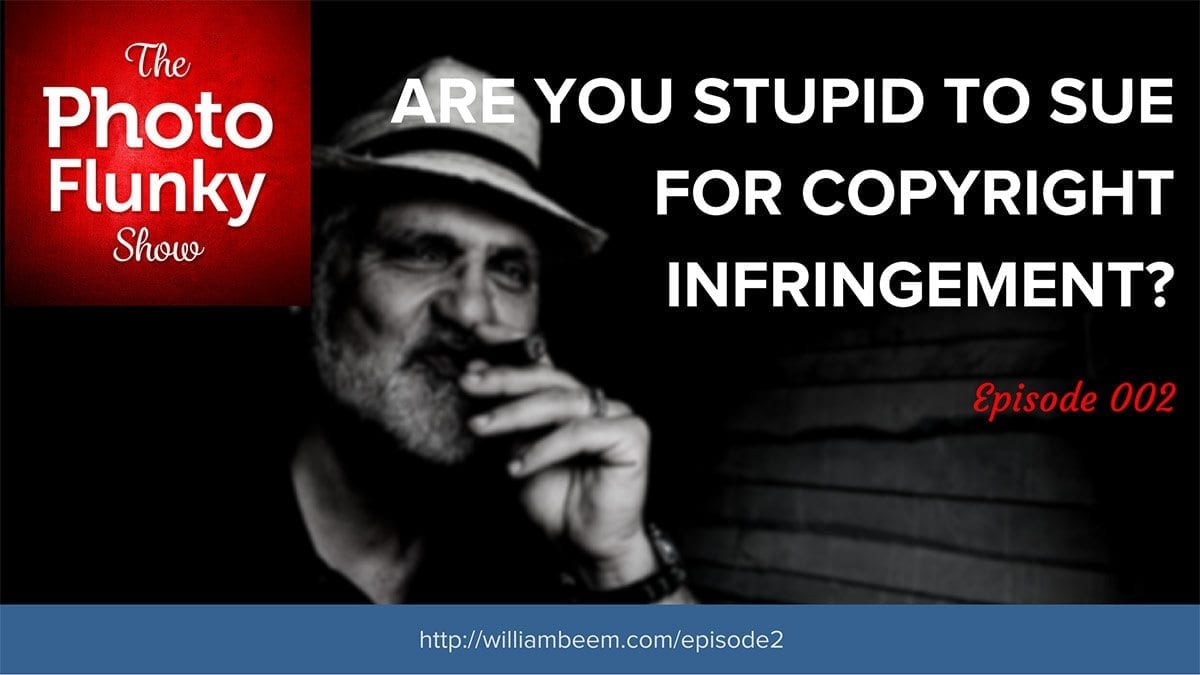
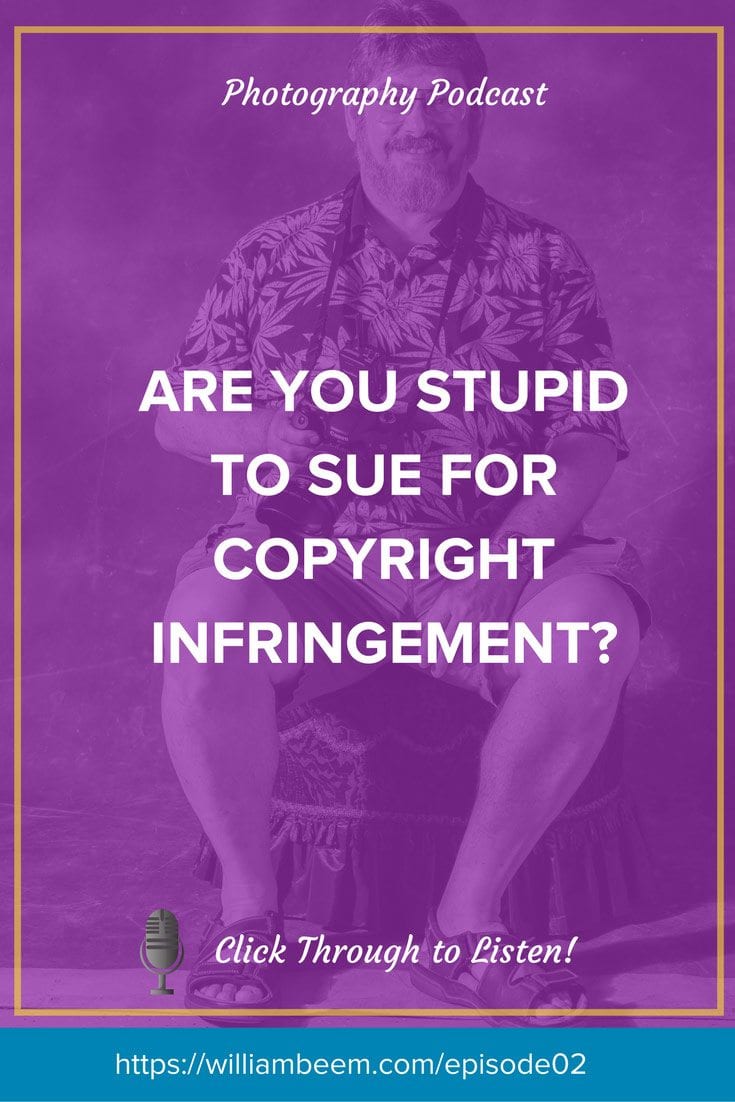
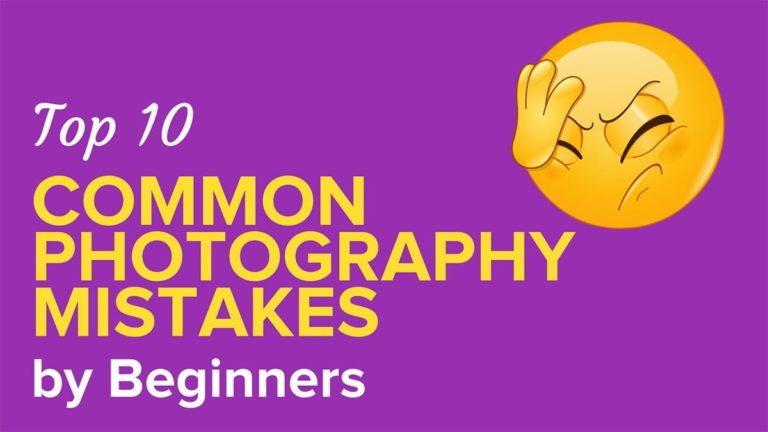
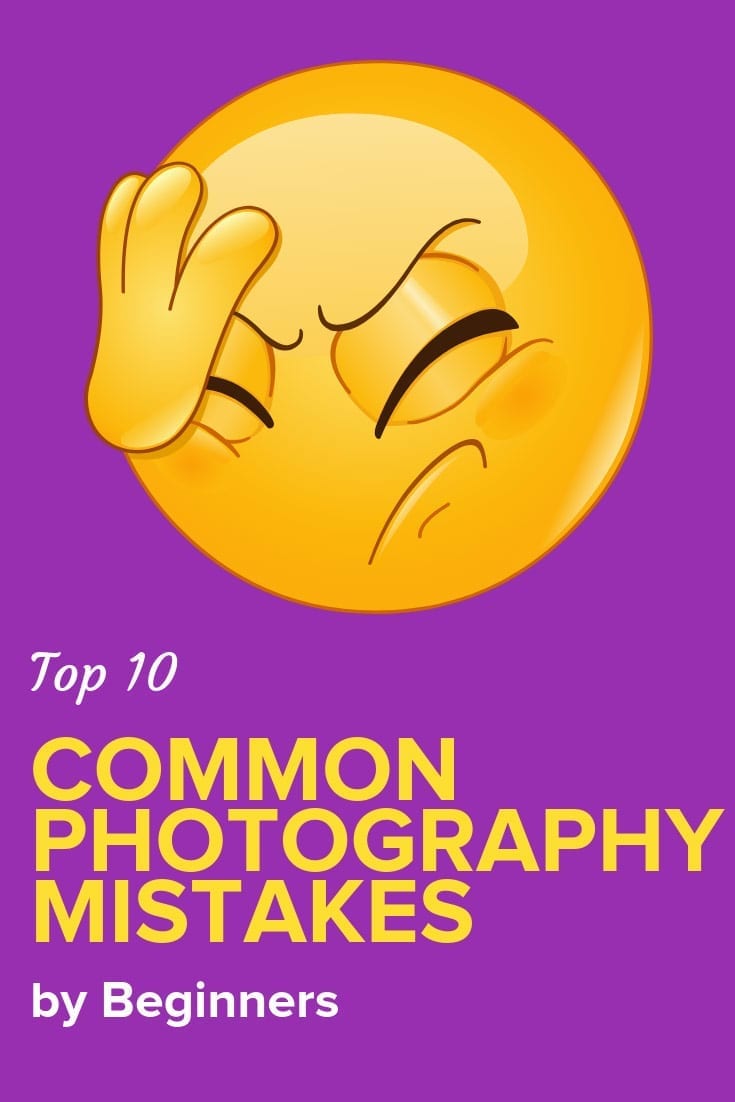
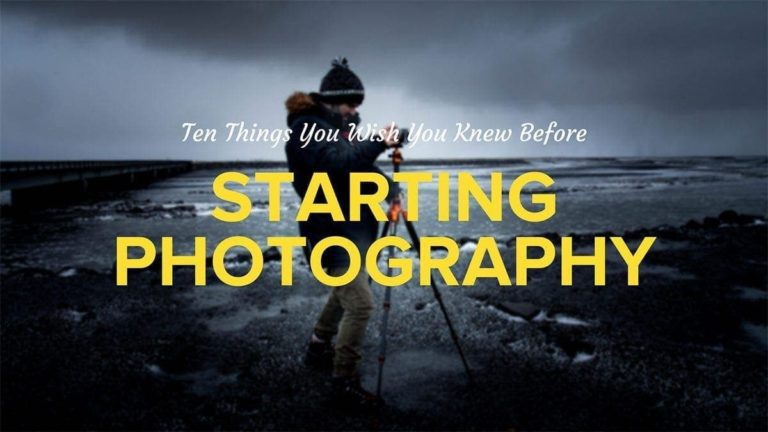
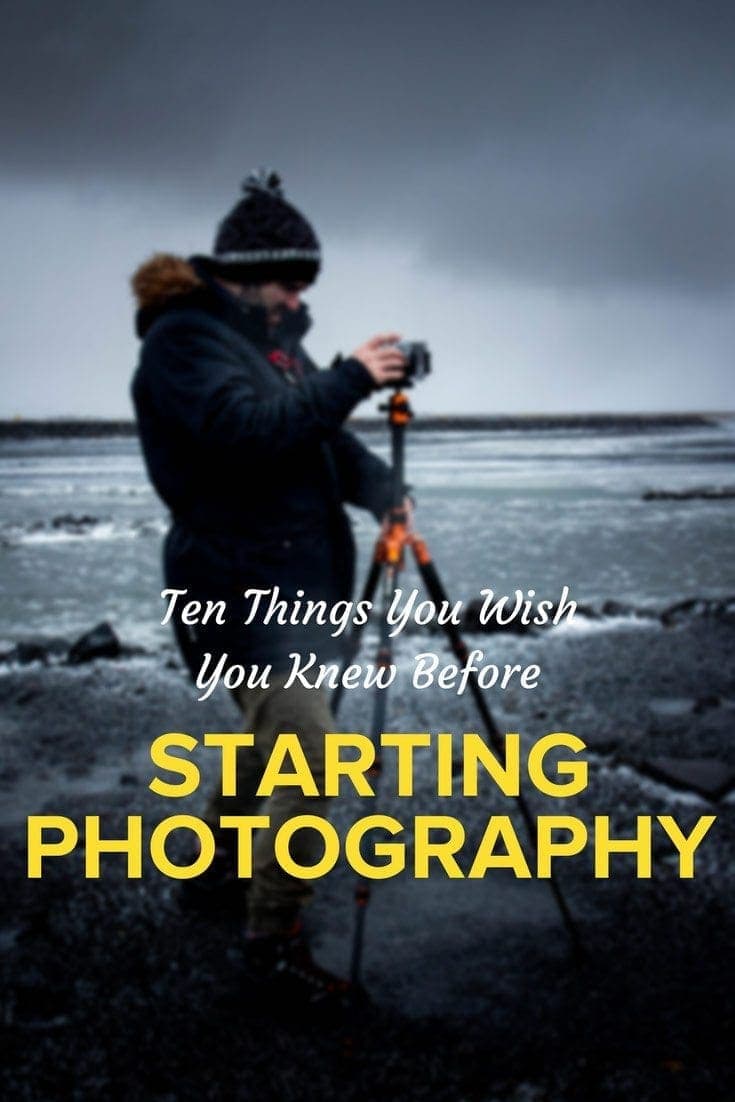




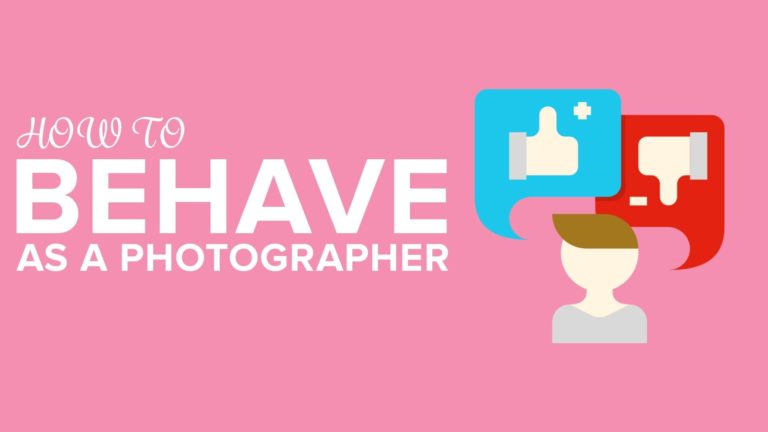
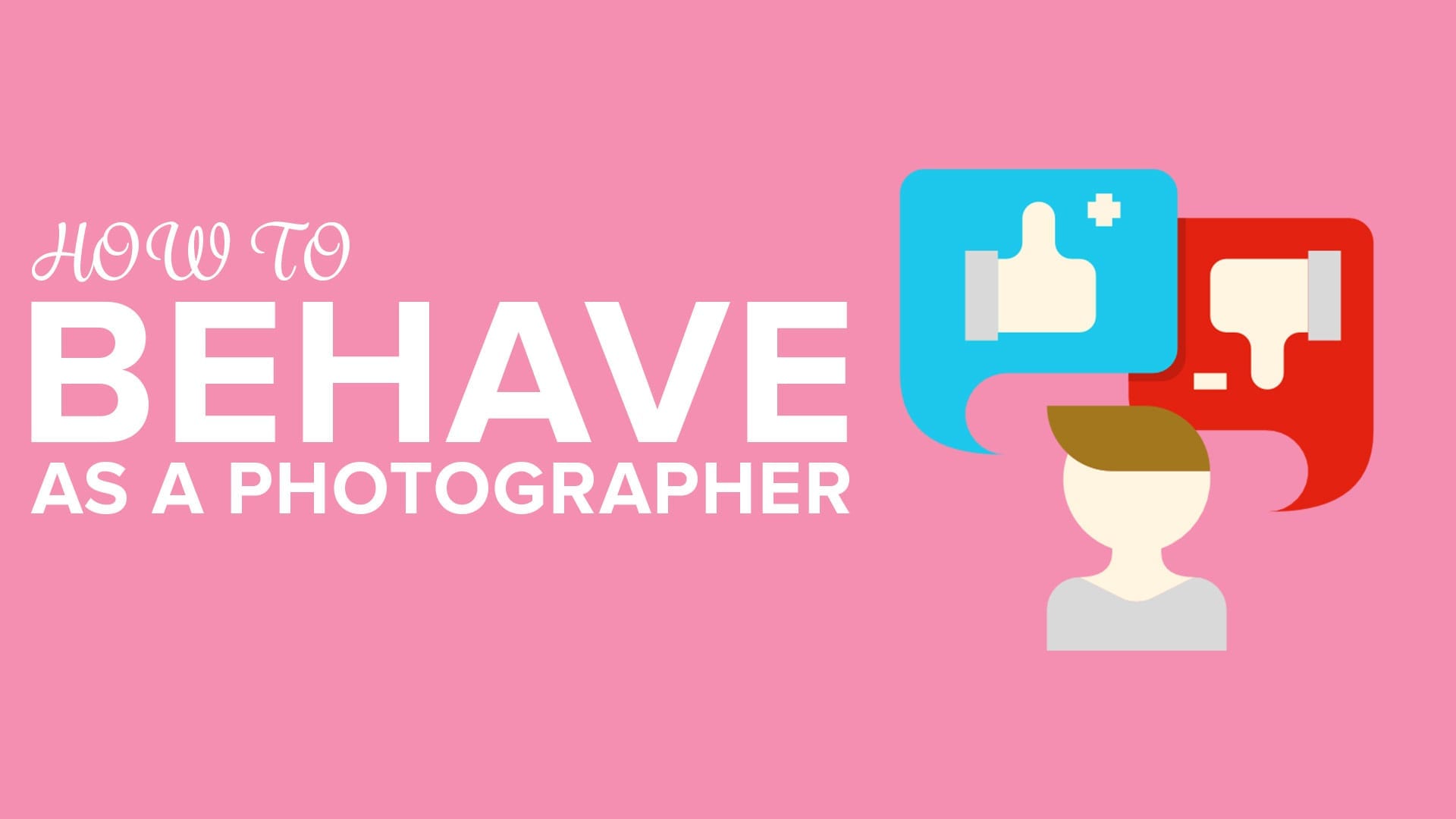


Yes really i also have experience similari, my photo at facebook all gone and i dont know how to protec the privacy. And now i closed my facebook.
Agnes,
Thanks for writing. I’m sorry to hear that you got ripped off. Unfortunately, there are people who just think that photos are free for the taking. It’s a balancing act between sharing and potential theft.
I’m really sorry to hear about your experience with lawyers. Disclaimer for the rest of this email: I’m a lawyer (and a photographer). I cannot speak to the federal judges in California or the local rules there. Judging them solely by your account during the podcast and by the standards under which I practice, you may have had some less-than-ethical lawyers.
Here, a lawyer needs court permission to withdraw from a case. That means, they may not just refuse to go to trial; they would have to have a hearing before a judge (assuming you would not voluntarily allow them to withdraw) and get the judge’s permission to no longer represent you. The judges here would not find, on the eve of trial, economic factors to be a sufficient reason to withdraw. My local judges think that is part of the risk you take accepting a case on contingency.
Of course, then you go to trial with lawyers who are holding a grudge against you, so it may still be unwise to continue with those lawyers representing you.
Tim,
Thanks for the comment.
We had a settlement offer that was well below what I expected, both from other cases I followed and from the information my lawyer initially told me to expect. Everything started off great. They said this was a good case with a clear infraction of copyright. All of that seemed to be true.
However, the defendants were well funded and willing to spend money to fight the suit. My attorneys changed their tune, because they apparently did not want to spend their money beyond what they hoped to recover just to prove my case.
Before I filed suit, I never considered the types of strategies that a well-funded defendant would bring to bear. Basically, they were going to make winning so expensive that it wouldn’t be worth the effort.
I argued with my attorney when he advised settling and asked to speak to someone senior. While this was happening, we were getting close to a deposition. I was under the impression that I wouldn’t have to attend, and then it turned out that I would have to attend. When I spoke to the Senior guy about it, he just seemed like a complete jerk to me. He basically put me in a position where I either had to fly out the next day or allow him to accept the settlement offer.
Well, I couldn’t abandon my job and fly off to LA the next day. He played me rather well and got what he wanted. I felt betrayed, but I’ve come to realize that he doesn’t care. The idea on the attorney’s side was to make a quick profit from my case, and then push me to settle when it appeared that it wasn’t going to be worth his effort.
As you say, I would have been out there with lawyers who were holding a grudge against me while footing the bill for my travel.
Basically, I learned a lesson in this experience about selecting attorneys. I found them through a recommendation from a friend, who it turned out had never used them before. My first swim in the legal pool was one I’d rather forget.